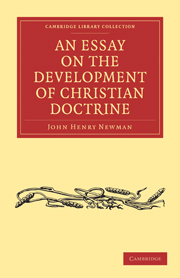Book contents
- Frontmatter
- ADVERTISEMENT
- Contents
- INTRODUCTION
- CHAPTER I ON THE DEVELOPMENT OF IDEAS
- CHAPTER II ON THE DEVELOPMENT OF CHRISTIAN IDEAS, ANTECEDENTLY CONSIDERED
- CHAPTER 3 ON THE NATURE OF THE ARGUMENT IN BEHALF OF THE EXISTING DEVELOPMENTS OF CHRISTIANITY
- CHAPTER IV ILLUSTRATIONS OF THE ARGUMENT IN BEHALF OF THE EXISTING DEVELOPMENTS OF CHRISTIANITY
- CHAPTER V ILLUSTRATIONS CONTINUED
- CHAPTER VI ILLUSTRATIONS CONTINUED
- CHAPTER VII ILLUSTRATIONS CONTINUED
- CHAPTER VIII ILLUSTRATIONS CONCLUDED
- Frontmatter
- ADVERTISEMENT
- Contents
- INTRODUCTION
- CHAPTER I ON THE DEVELOPMENT OF IDEAS
- CHAPTER II ON THE DEVELOPMENT OF CHRISTIAN IDEAS, ANTECEDENTLY CONSIDERED
- CHAPTER 3 ON THE NATURE OF THE ARGUMENT IN BEHALF OF THE EXISTING DEVELOPMENTS OF CHRISTIANITY
- CHAPTER IV ILLUSTRATIONS OF THE ARGUMENT IN BEHALF OF THE EXISTING DEVELOPMENTS OF CHRISTIANITY
- CHAPTER V ILLUSTRATIONS CONTINUED
- CHAPTER VI ILLUSTRATIONS CONTINUED
- CHAPTER VII ILLUSTRATIONS CONTINUED
- CHAPTER VIII ILLUSTRATIONS CONCLUDED
Summary
Christianity has been long enough in the world to justify us in dealing with it as a fact in the world's history. Its genius and character, its doctrines, precepts, and objects cannot be treated as matters of private opinion or deduction, unless we may reasonably so regard the Spartan institutions or the religion of Mahomet. It may legitimately be made the subject-matter of theories; what is its moral and political excellence, what its due location in the range of ideas or of facts which we possess, whether it be divine or human, whether original or eclectic, or both at once, how far favourable to civilization or to literature, whether a religion for all ages or for a particular state of society, these are questions upon the fact, or professed solutions of the fact, and belong to the province of opinion; but to a fact do they relate, on an admitted fact do they turn, which must be ascertained as other facts, and surely has on the whole been so ascertained, unless the testimony of so many centuries is to go for nothing. Christianity is no dream of the study or the cloister. It has long since passed beyond the letter of documents and the reasonings of individual minds, and has become public property. Its “sound has gone out into all lands,” and its “words unto the ends of the world.” It has from the first had an objective existence, and has thrown itself upon the great concourse of men.
- Type
- Chapter
- Information
- An Essay on the Development of Christian Doctrine , pp. 1 - 29Publisher: Cambridge University PressPrint publication year: 2010First published in: 1845



